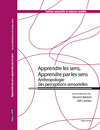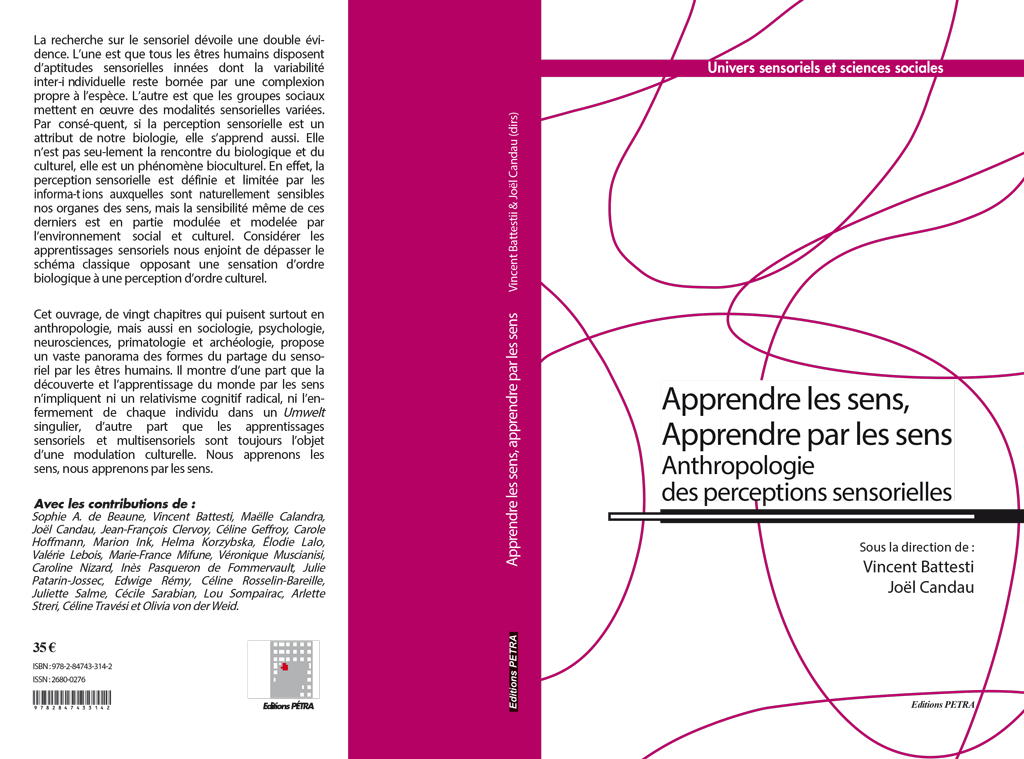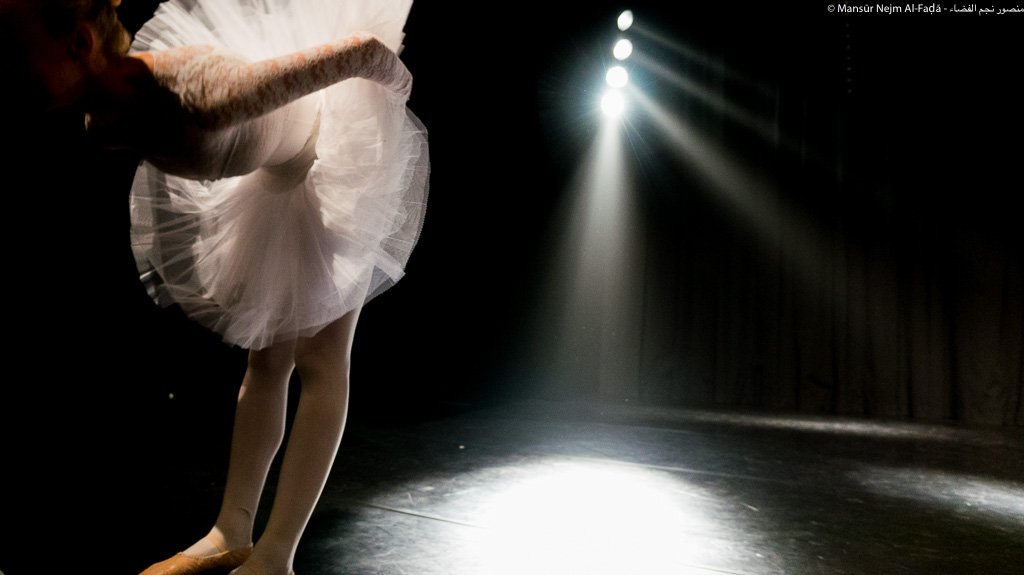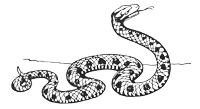Learning the senses, learning through the senses: Anthropology of sensory perceptions
A New Book!

– Learning the senses, learning through the senses: Anthropology of sensory perceptions.
– Original title [in French]: Apprendre les sens, apprendre par les sens: Anthropologie des perceptions sensorielles, Vincent Battesti & Joël Candau (eds.), Dec. 2023.
Paris, Éditions Pétra, series “Univers sensoriels et sciences sociales” [ISSN: 2680-0276], 600 p.
ISBN: 978-2-84743-314-2
– Notice: https://hal.science/hal-03917206
– Book page on the publishing house website: https://www.editionspetra.fr/livres...
– Summary:
A double obviousness is highlighted by researchers working on the sensory, whatever their disciplinary horizon. One is that all human beings have innate sensory aptitudes whose inter-individual variability remains limited by a complexion specific to the species. The other is that different social groups use different sensory modalities (Howes, 1991). Therefore, if sensory perception is an attribute of our biology, it is also learned. It is not only the crossing of the biological and the cultural, it is a biocultural phenomenon in the sense that if it is defined and limited by the information to which our sense organs are naturally sensitive, the very sensitivity of the latter is partly modulated and modelled by the social and cultural environment. That thus goes beyond the traditional diagram (Schilder, 1935) which opposes the sensation which would be of the biological order to the perception which would be of the cultural order.
This modulation and shaping of sensory perceptions are the product of interactions with a physical and social environment and of cultural learning, whether deliberate, explicit and codified or simply “evoked” (impregnation, embodiment, etc.), implicit, not formalised. This learning, which aims to make the best use of the sensory aptitudes of individuals, according to the expectations of the social group, is thus socially and culturally modulated. Thus, in many sociocultural configurations, for example, the learning of visual skills is privileged. But in other configurations, the balance of the senses may be different and the emphasis on tactile, olfactory, and other skills may be different. Moreover, with regard to a given sense, the exploitation of the sensory sensitivity of individuals will be more or less developed according to the sociocultural configuration considered. In short, there is an enculturation of perception, induced by learning, enskilment, and modulated in historical time (think of the work of Alain Corbin) or in the range of contemporary sociocultural configurations.
The aim of this book is to bring together contributions devoted to this theme from various disciplinary backgrounds: the learning of the sensory and the sensory in learning. Enskilment is one of the best keys to understanding the social and cultural shaping of our sensory equipment, whether in early childhood when we learn to read, hear, feel (etc.) the world, or when we learn and acquire expert sensorialities (profession, various pastimes). One can also expect a reflection from social scientists on the methodological stakes that represents the observation of sensory learning and experiences – often “difficult to put into words” and sometimes not at all – as well as on their own sensory learning of the social worlds in which they are immersed. For example, the anthropologist or the archaeologist must decentre him/herself from his/her own sensory universe and go through an apprenticeship to glimpse that of the social groups on which he/she works and to restore the gestures of the past.
This volume will be structured by three themes:
- The primary learning of sensory perceptions.
Early childhood is undoubtedly the privileged moment to observe this sensory learning. During primary socialisation, how are our sensory abilities modulated and shaped? What are the mechanisms and modalities of this learning? Is it always optimal? What is the balance between the different senses? Is learning gendered? What is the effect of ICT and of the increasing share taken by virtual environments? - Expert learning.
We inherit sensory universes that seem natural and often unspeakable; sensorialities are therefore difficult to question and study. However, new sensory learning is at work, sensory universes are acquired within the framework of professional, familial, or recreational expertise (oenology, cooking, hunting, etc.). Like childhood, they are favourable moments to study the cultural learning of these sensorialities. - Assimilate the sensorialities of others.
In theory, the ethnographer knows that he/she must be reflexive and “decentre” from his/her own categories, especially sensorial ones, when he/she is in the field and tries to understand the sensorial universes of “others”. Learning about sensorialities should also be one of the anthropologist’s professional activities. It goes without saying that the sensorialities of others should be addressed, but should the researcher also present his or her own sensorial learning? What about other professions, such as archaeology, which can only question artefacts, shadows of disappeared sensorialities, and rely on its own sensorial perceptions to find those of the past?
The project of this book should be an opportunity for fruitful exchanges between researchers from different disciplines (anthropology, biology, ethnoecology, ethnomusicology, cognitive ethology, prehistory, developmental psychology, etc.). In this interdisciplinary spirit, contributions not only from anthropology but also from the above-mentioned disciplines, as well as contributions, even experimental ones, written by four hands have been strongly encouraged.

- Battesti, Vincent & Joël Candau (dirs), 2023 — Apprendre les sens, apprendre par les sens : Anthropologie des perceptions sensorielles, Paris, Éditions Pétra (coll. Univers sensoriels et sciences sociales), 598 p.
– Chapters with their author(s) (in chapter order):
- Vincent Battesti & Joël Candau — Conditions et modalités des apprentissages sensoriels: une disputatio anthropologique
- Arlette Streri — Apprenons-nous à percevoir?
- Inès Pasqueron de Fommervault — Éthique et esthétique du corps riant: l’apprentissage sensoriel des enfants haya
- Céline Geffroy — Apprendre à s’enivrer. Une expérience intériorisée dès le plus jeune âge dans les Andes boliviennes
- Céline Travési — Le modelage et le rôle des perceptions sensorielles dans l’apprentissage des savoirs et des savoir-faire écologiques des Aborigènes Bardi (Kimberley, Australie-Occidentale)
- Maëlle Calandra — Une ethnographie du processus de production du “beau” jardin à Tongoa (Vanuatu)
- Lou Sompairac — L’odeur familière, une expérience proprement inconnue?
- Valérie Lebois — Une approche incarnée et sensible de l’architecture. Explorer les relations corps, espace, matière
- Juliette Salme — L’anatomie par (le) corps. Disséquer et apprendre à voir le cadavre comme corps-objet anatomique
- Élodie Lalo & Céline Rosselin-Bareille — Sens dessus dessous. Apprentissages sensoriels et environnements hostiles chez les scaphandriers travaux publics
- Julie Patarin-Jossec & Jean-François Clervoy — Une discipline du sensible : le rapport aux sens dans l’apprentissage et l’expérience de vol des astronautes
- Véronique Muscianisi — “Une enquête tactile”. L’apprentissage sensoriel des acteurs gestuels
- Caroline Nizard — Conférer du sens à l’expérience sensible. Le cas du yoga
- Edwige Rémy — Une ethnographie de l’ouïe au travail. Le cas de l’apprentissage du métier d’opérateur en raffinerie de pétrole
- Olivia von der Weid — À fleur de peau: la cécité et les habiletés tactiles de la perception
- Helma Korzybska — Donner un sens au sens bionique. Rééducation sensorielle et sensible à la suite de l’implantation cochléaire
- Marion Ink — Pour une approche pratico-sensible de la perception. Ce que les handicaps visuels et auditifs nous apprennent des sens
- Carole Hoffmann — Plasticité du corps: l’intersensorialité au feu des technologies numériques
- Sophie A. de Beaune & Marie-France Mifune — Étudier les gestes et sensorialités du présent pour retrouver ceux du passé: approches croisées en préhistoire et en ethnomusicologie
- Cécile Sarabian — Les origines du dégoût: évitement du risque infectieux par les sens chez les primates.
– Table of contents and chapter abstracts:
- Table des matières et résumés des chapitres de l’ouvrage “Apprendre les sens, apprendre par les sens, Anthropologie des perceptions sensorielles”, Battesti & Candau (2023)
– Book flyer (order form):
- Flyer (bon de commande) - Apprendre les sens, apprendre par les sens, Anthropologie des perceptions sensorielles, Battesti & Candau (2023)
– Call for papers (for the record):
Appel à contributions pour l’ouvrage : « Anthropologie des perceptions sensorielles : Apprendre les sens, apprendre par les sens »
– See the introduction to this book:
Conditions and modalities of sensory enskilment: an anthropological disputatio
– Milestones:
- Call for papers: July 17, 2019 ✅
- Receipt of chapter abstracts: October 1, 2019 ✅
- Notifications to authors of acceptance or rejection of their proposal: October 15, 2019 ✅
- Deadline for receipt of completed chapters: February 3, 2020 ✅ (postponed due to Covid-19)
- Script evaluations and return to authors by end of May 2020 ✅
- Return of selected chapters (in second draft) by end of July 2020 ✅
- Second draft evaluations by mid-October 2020 ✅
- Return of selected chapters (in third draft) by end of December 2020 ✅
- Proofreading and compilation of the book January and February 2021 ✅
- Submission of full book proposal to a publishing house: March 2021 ✅
- Evaluation of the work by the publishing house: April-May 2021 ✅
- Book layout by the publishing house: (June 2021… waiting for the publishing house…) January 2023 ✅
- Proofreading by the authors: February 2023 ✅
- Proofreading by the book’s scientific editors: July 2023 ✅
- Proofreading by the book’s scientific editors: August 2023 ✅
- Release of the book: end of 2021 - beginning 2022 - 15 May 2023 (...) (…) (…) (…) (…) waiting for the publishing house (…).
- Book publication: Dec. 4th, 2023. ✅

Nouveau livre!
« Apprendre les sens, apprendre par les sens: Anthropologie des perceptions sensorielles », V. Battesti & J. Candau (dirs), 2023, Paris, Pétra, 598 p.⁰ISBN : 978-2-84743-314-2 https://t.co/hQp3w5kv17 @CNRS @CNRSshs @CNRSecologie @Le_Museum #anthropology #sensory pic.twitter.com/44x1OErhsF— Vincent Battesti (@Battesti) December 5, 2023


 vbat.org
vbat.org


